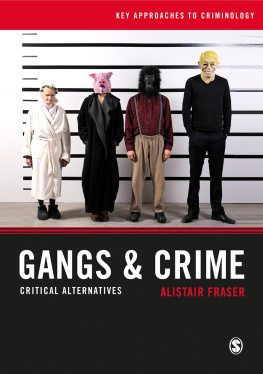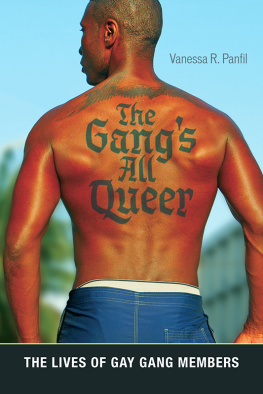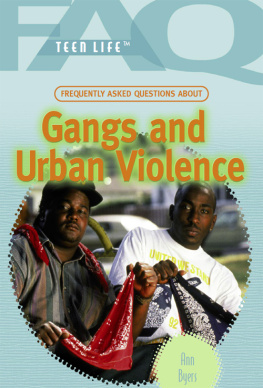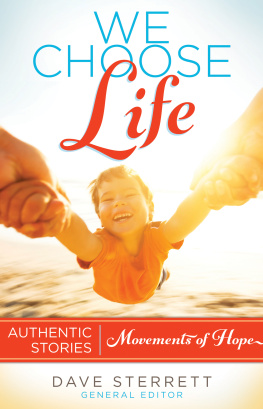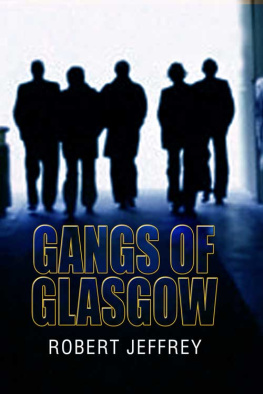Foreword
W e step out to the margins because it is the only way margins get erased. Look under your feet. Suddenly, we are moving from being separate and superior, to connected and compassionate. We are tentative in locating ourselves at the edges of things because we fear folks will accuse us of wasting our time. But the prophet Jeremiah writes: For in this place of which you say, it is a waste, there will be heard again the voice of mirth and the voice of gladnessthe voices of those who sing.
Anne Mahon, in this fine and sensitive collection, has made those voices heard. She has chosen in Redemption: Stories of Hope, Resilience and Life After Gangs to be an enlightened witness, who through her kindness, tenderness and focused, attentive love has returned people to themselves. In this book, she has embodied what James Baldwin called us achieving ourselves. And these voices come through loud and clear.
For thirty years Ive worked with gang members in Los Angeles and have been privileged to be reached by them. My life has been altered and my heart reshaped. And the day wont ever come when I have more courage, or am more noble or am closer to God than the thousands of men and women Ive been honoured to know. But no one goes to the margins to rescue anyone or to feel superior. The gift in standing at the edges is not to save the world but to savour it. What we receive is the gift of awe, an ability to stand in awe at what the poor have to carry, rather than in judgment at how they carry it.
Anne Mahon shows us through these clear voices the possibility of our exquisite mutuality. That if we imagine a circle of compassion, and then imagine no one standing outside of that circle, our standing with dismantles the barriers that divide. Only then, in this kinship, can we obliterate the illusion that we are separate. This fine book helps us stand against forgetting that we belong to each other. No Us and Them, only Us.
Anyone who believes in God, believes in a God of second chances. We are heartened to journey with those featured in this book as they come to terms with and do the hard work of transformation. We feel edified to witness people inhabiting the truth of who they are: exactly what God had in mind when God made them. Every story here asserts this: it is the privilege of a lifetime for each one of them to be who they are.
So, we dont go to the margins to rescue anyone. Saving lives is for the coast guard. We wander to the edgesand go figurewe all find rescue there. Every one of us, returned to ourselves. Oh nobly born, the Buddhists put it, do not forget who you are.
Redemption: Stories of Hope, Resilience and Life After Gangs is an invitation to our own nobility, found in the exquisite mutuality of kinship. We dont just observe these lives here in this volume, but feel, palpably, Us achieving ourselves.
And before too long, we cease to care if anyone accuses us of wasting our time. For in this place, of which you say, it is a wastethere will be heard again, the voice of mirth and the voice of gladnessthe voices of those who sing. We hear you.
Greg Boyle, S.J.
Founder of Homeboy Industries
Author of Tattoos on the Heart
Introduction
A book can be a catalyst for another books creation. The first time I read Father Greg Boyles book, Tattoos on the Heart , it was 2011 and it had just been published. Reading his tender depiction of tough Los Angeles gang members leaving their gangs and transforming their lives was memorable. During the summer of 2013, after the release of my first book, The Lucky Ones: African Refugees Stories of Extraordinary Courage , I had been asking myself what was next for me and whether my first book was a one-off life experience.
My answer was that I wanted to write another. Like my first book, my next would be about a disempowered community of people and focus on hope and transformation. I am an extremely curious person who wants to connect with people on a deep level and bear witness to them, expanding my world and growing in the process. I considered a few different topics, but they didnt feel right.
Then in the fall of 2013, I was serendipitously reminded of Father Gregs book while listening to a speech at an event I was invited to for a completely unrelated reason. I reread his book immediately. A few days later, I was once again asking myself what the topic for my next book could be. The idea floated up effortlessly: a book about Winnipeg gang members who had left their gang and rebuilt their lives. I instantly knew it was the right answer.
I was curious about the kind of lives people live before they join gangs, what being in a gang is really like, and most importantly, how someone entrenched in that violent, criminal world can get out. My challenges would be trying to figure out how to find participants, gain their trust and convince them to share their stories with me, while being an outsider to the gang world. I knew that in writing these stories I would be far out of my upper middle-class comfort zone, but I liked the idea of that. I began to research the topic and community right away.


